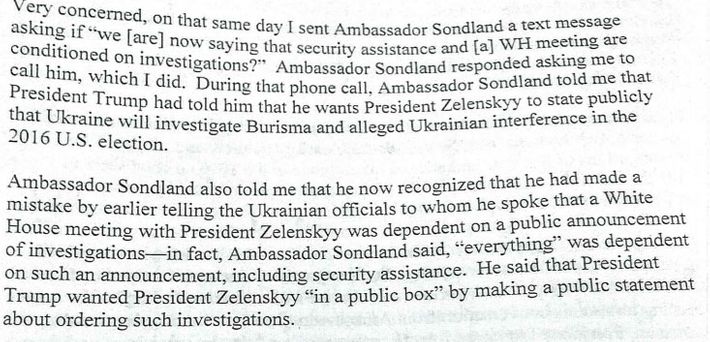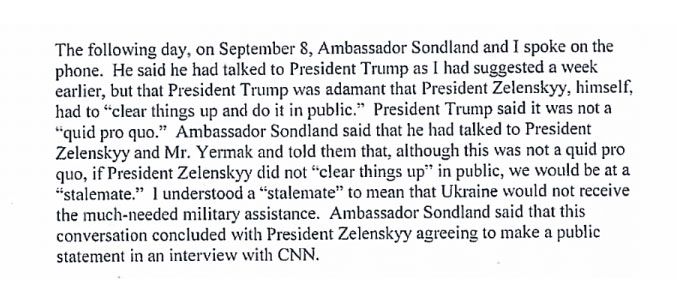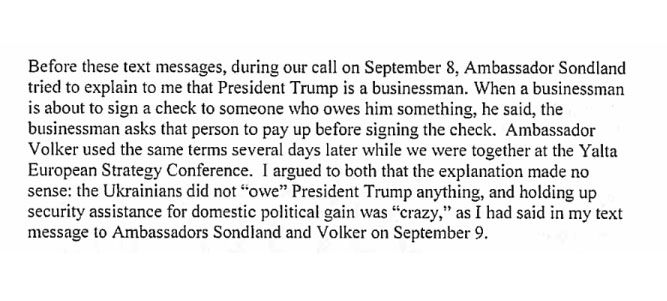
For several weeks, Republicans have implicitly set the bar for an impeachable offense in the Ukraine scandal as evidence of a direct link between military aid and an investigation of Joe Biden. On September 24, David Drucker reported for the conservative Washington Examiner, “Republicans in Congress could break ranks with President Trump and support impeachment if evidence emerges that he directly linked Ukraine military aid to an agreement by Kyiv to investigate political rival Joe Biden,” quoting two sources who said exactly this. Asked this week if any possible evidence could make him support impeachment, Lindsey Graham replied, “Sure … If you could show me that, you know Trump actually was engaging in a quid pro quo.”
Clearly, they assumed no such evidence would be found. But William Taylor, the U.S.’s acting ambassador to Ukraine, has blown apart that in his testimony to the House.
Taylor’s testimony includes several instances in which Gordon Sondland confirms the direct quid pro quo. Sondland, the European Union ambassador, is a Republican fundraiser with limited diplomatic experience, a background that likely made Trump turn to him to bridge the gap between the official diplomatic bureaucracy and off-the-books shakedown run by Rudy Giuliani and his Russian mobster partners.
Sondland spoke regularly with Taylor, and on several occasions made explicit to Taylor Trump’s desire to trade both the meeting and the military aid Ukrainian president Zelensky wanted in return for the investigations Trump wanted. On September 1, Sondland told Taylor that both the meeting and the aid were being held up for the investigations, and that Trump wanted a public announcement of the probes:

After this conversation, Taylor goes on to describe how Sondland and Trump had apparently come to realize the political danger of going on record to demand this trade. So they formally denied a quid pro quo whenever the exact term came up. And yet, on two different occasions, Sondland described Trump’s policy as exactly that.
Sondland tells Taylor that he communicated to Zelensky that, if he failed to make a public statement announcing the investigations — that is, a statement that could be used as evidence Biden was being investigated for wrongdoing — they would be at a “stalemate”:

(This, by the way, blows up a favorite conservative defense that the Ukrainians had not been informed of why their aid was being held up.)
And Sondland told Taylor that Trump was making his demands in return for releasing the aid because he is a “businessman”:

Now, what does Taylor’s testimony mean in practice? First, I don’t happen to think “explicit quid pro quo” was ever the correct standard. In diplomacy, trading is always assumed. The improper action was Trump and his representatives asking Ukraine to investigate his domestic rivals. There is an inherent quid pro quo attached to any such request.
Second, numerous Trump officials have confessed the quid pro quo openly. On September 23, Trump told reporters both that by investigating “corruption” he specifically meant Biden:
Reporter: Can you say whether, on this call, you raised Joe Biden or his son’s name with Ukraine?
Trump: Well, I don’t even want to mention it, but certainly I’d have every right to. I’d have every right to. If there’s corruption, and we’re paying lots of money to a country, we don’t want a country we’re giving massive aid to to be corrupting our system, and we don’t want it to be corrupt in any way.
… And that he held up the aid to demand the investigation of “corruption” (i.e., Biden):
Trump: It’s very important to talk about corruption. If you don’t talk about corruption, why would you give money to a country that you think is corrupt?
Vice-President Mike Pence said essentially the same thing on October 2 — when asked if aid was being held up to force an investigation of Biden, he affirmed that it was. And a few days ago, Mick Mulvaney publicly admitted there was a quid pro quo, though he limited his confession to demands for an investigation of Ukraine’s role in the 2016 election, and then claimed he never said what he said. Plus, of course the rough transcript of Trump’s phone call with Zelensky shows Trump asking for an investigation of the Bidens while Zelensky was asking for him to agree to hold a meeting.
No intelligent person could possibly doubt that Trump’s policy toward Ukraine was built around leveraging Ukraine’s security needs in return for investigations. The appearance of even more evidence of this may or may not change the behavior of Republicans in Congress. Clearly, they are willing to overlook a lot.
That said, Taylor’s testimony does suggest why Republicans drew the line at “no quid pro quo” in the first place. As Taylor documents, Sondland and Trump both became aware over the summer that they needed to deny a formal quid pro quo. Trump probably concluded that he had covered all his tracks, and that his implicit demands of a quid pro quo would not be enough proof. As long as he phrased his demand to investigate Biden using the code word “corruption,” and as long as he could say there was no quid pro quo, he had a colorable defense.
Or so he thought. The problem is that, even as they were denying the quid pro quo, Trump had to have his diplomats carry out the actual policy, which was precisely that. Taylor took very careful notes of all of his conversations. Republicans in Congress might wonder, if Trump blew this case, what else is he lying about?






























